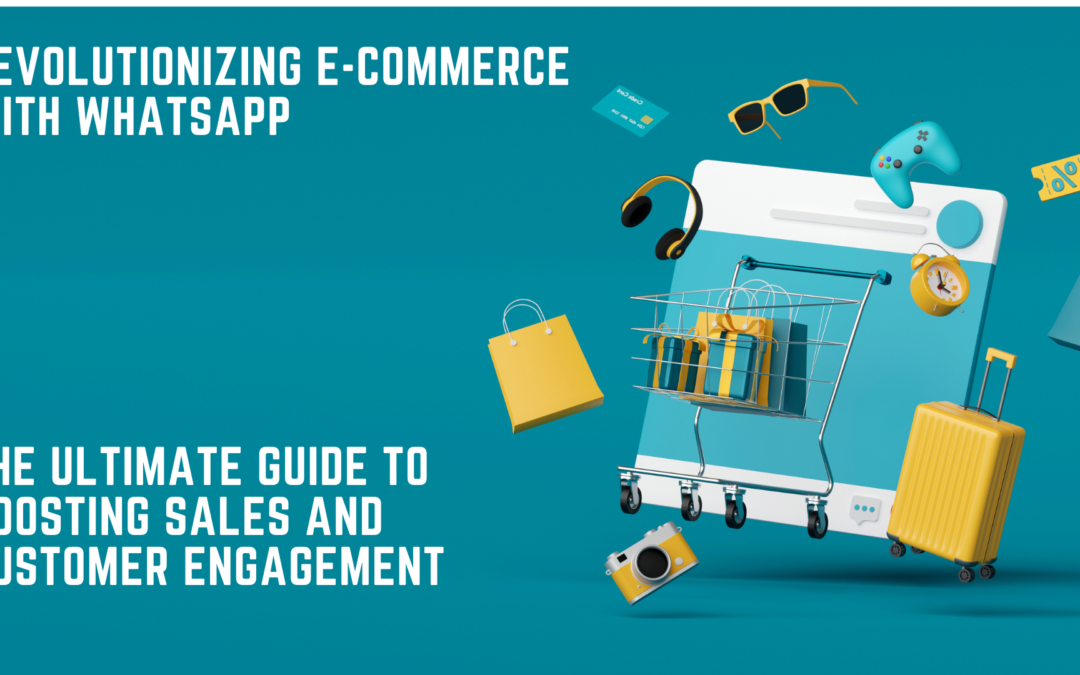In the ever-evolving world of e-commerce, staying ahead of the curve is crucial for success. As online shopping continues to grow, businesses are constantly seeking innovative ways to connect with customers, streamline operations, and boost sales. Enter WhatsApp – the world’s most popular messaging app that’s rapidly becoming a game-changer in the e-commerce landscape.
At We Are Gabba, we’ve seen first-hand how WhatsApp can transform e-commerce businesses. In this comprehensive guide, we’ll explore why WhatsApp is becoming an essential tool for online retailers and how you can leverage its power to take your e-commerce business to new heights.
Why WhatsApp for E-commerce?
- Massive User Base With over 2 billion active users worldwide, WhatsApp provides an unparalleled opportunity to reach a vast audience. In many countries, it’s the primary communication app, making it an ideal platform for businesses to connect with customers where they’re already spending their time.
- High Engagement Rates WhatsApp boasts impressive open and engagement rates. Messages on WhatsApp have a 98% open rate and a 45-60% click-through rate, far surpassing traditional email marketing metrics. This means your messages are more likely to be seen and acted upon.
- Rich Media Capabilities Unlike SMS, WhatsApp allows for the easy sharing of images, videos, and documents. This rich media support enables businesses to showcase products, share catalogues, and provide detailed information in an engaging format.
- Direct and Personal Communication WhatsApp enables one-on-one conversations, allowing businesses to provide personalized customer service, answer queries, and build stronger relationships with customers.
- Integration with Facebook Ecosystem As part of the Meta (formerly Facebook) family, WhatsApp can be integrated with Facebook Shops and Instagram Shopping, creating a seamless multi-channel experience for customers.
Key WhatsApp Features for E-commerce
- WhatsApp Business API The WhatsApp Business API is a game-changer for e-commerce. It allows businesses to send automated messages, create chatbots, and integrate WhatsApp with their existing CRM and e-commerce platforms. This enables automated order updates, personalized product recommendations, and efficient customer support.
- Catalog Feature WhatsApp’s catalog feature allows businesses to showcase their products directly within the app. Customers can browse products, view details, and even make purchases without leaving WhatsApp.
- Quick Replies and Automated Messages These features enable businesses to respond promptly to common queries, provide instant order updates, and offer 24/7 customer support, even outside of business hours.
- Broadcast Lists WhatsApp’s broadcast feature allows businesses to send messages to multiple customers at once, making it an effective tool for promotions, new product launches, and flash sales.
- Payment Integration In some countries, WhatsApp has introduced in-app payment solutions, allowing customers to complete transactions directly within the app. This feature is expected to expand globally, further streamlining the purchasing process.
Implementing WhatsApp in Your E-commerce Strategy
- Set Up WhatsApp Business Account Start by creating a WhatsApp Business account. This gives you access to business-specific features like business profiles, catalogues, and quick replies.
- Integrate with Your E-commerce Platform Integrate WhatsApp with your existing e-commerce platform to synchronize product information, inventory, and customer data. This allows for seamless order management and personalized customer interactions.
- Develop a Chatbot Strategy Implement chatbots to handle routine inquiries, provide product recommendations, and guide customers through the purchasing process. This not only improves customer experience but also frees up your team to handle more complex issues.
- Create Engaging Content Leverage WhatsApp’s rich media capabilities to create engaging content. Share product images, how-to videos, and customer testimonials to showcase your offerings and build trust.
- Personalize Customer Interactions Use customer data to personalize communications. Send tailored product recommendations, offer birthday discounts, and provide personalized order updates to enhance the customer experience.
- Implement Abandoned Cart Recovery Use WhatsApp to send reminders to customers who have abandoned their carts, potentially recovering lost sales.
- Offer Customer Support Provide responsive customer support through WhatsApp. Answer queries promptly, assist with returns and exchanges, and gather feedback to improve your products and services.
- Run Exclusive Promotions Create WhatsApp-exclusive promotions to incentivize customers to engage with your brand on the platform. This can include flash sales, early access to new products, or special discounts.
Best Practices for WhatsApp E-commerce
- Respect Privacy: Always obtain explicit consent before messaging customers on WhatsApp.
- Be Responsive: Aim to respond to customer inquiries promptly, ideally within a few hours.
- Keep It Professional: Maintain a professional tone in all communications, even while being friendly and personable.
- Provide Value: Ensure that your messages provide value to the customer, whether it’s through helpful information, exclusive offers, or prompt support.
- Monitor Analytics: Regularly review your WhatsApp analytics to understand what’s working and what needs improvement.
- Stay Compliant: Adhere to WhatsApp’s business policies and local regulations regarding messaging and data privacy.
- Integrate with Other Channels: While WhatsApp can be powerful, it should be part of a broader omnichannel strategy that includes your website, email, and other social media platforms.
For a more in-depth look at how chatbots can revolutionize your e-commerce business, check out our ecommerce website page.
The Future of WhatsApp in E-commerce
As WhatsApp continues to evolve, we can expect to see even more features tailored for e-commerce. This may include enhanced payment options, improved analytics, and deeper integration with other business tools.
The rise of conversational commerce, where customers can complete entire transactions through chat interfaces, is likely to accelerate with WhatsApp leading the charge. Businesses that embrace this trend early will be well-positioned to capitalize on changing consumer preferences.
Conclusion
WhatsApp is no longer just a messaging app – it’s becoming an essential tool for e-commerce businesses looking to engage customers, streamline operations, and boost sales. By leveraging WhatsApp’s features and following best practices, you can create a more personalized, efficient, and enjoyable shopping experience for your customers.
At We Are Gabba, we specialize in helping businesses harness the power of WhatsApp and other messaging platforms to transform their e-commerce operations. If you’re ready to take your online store to the next level with WhatsApp, we’re here to help.
Ready to revolutionize your e-commerce business with WhatsApp? Book a demo with We Are Gabba today and discover how we can help you leverage the power of WhatsApp to boost your sales and customer engagement.


